Daily Bread Meaning In The Bible: Provision and Trust
The concept of ‘daily bread‘ in the Bible, as articulated in the Lord’s Prayer (Matthew 6:11, Luke 11:3), signifies both physical sustenance and spiritual nourishment. Rooted in the Greek term ‘epiousios,’ meaning ‘necessary for existence,’ it echoes the Israelites’ reliance on manna during their exodus (Exodus 16:15-21).
This dual provision underscores God’s constant care and the intimate, dependent relationship believers maintain with Him. Historically contextualized within agrarian and oppressed societies, ‘daily bread’ also metaphorically represents Jesus as the ‘bread of life’ (John 6:35).
Understanding this rich imagery further enriches one’s appreciation of divine providence and spiritual fulfillment.

Daily Bread Meaning in the Bible: Dependence on God’s Provision
| Aspect | Description |
|---|---|
| Phrase Origin | From the Lord’s Prayer (Matthew 6:11) |
| Literal Meaning | Daily sustenance or food |
| Spiritual Meaning | Dependence on God for all needs, both physical and spiritual |
| Key Scripture | Matthew 6:11 – “Give us this day our daily bread” |
| Old Testament Connection | Manna from heaven provided to Israelites in the wilderness |
| Symbolism | God’s provision, trust, and daily reliance on Him |
| Theological Insight | Encourages living one day at a time with faith in God’s care |
| Relevance Today | Reminds believers to seek God daily for strength, guidance, and sustenance |
Biblical Origins
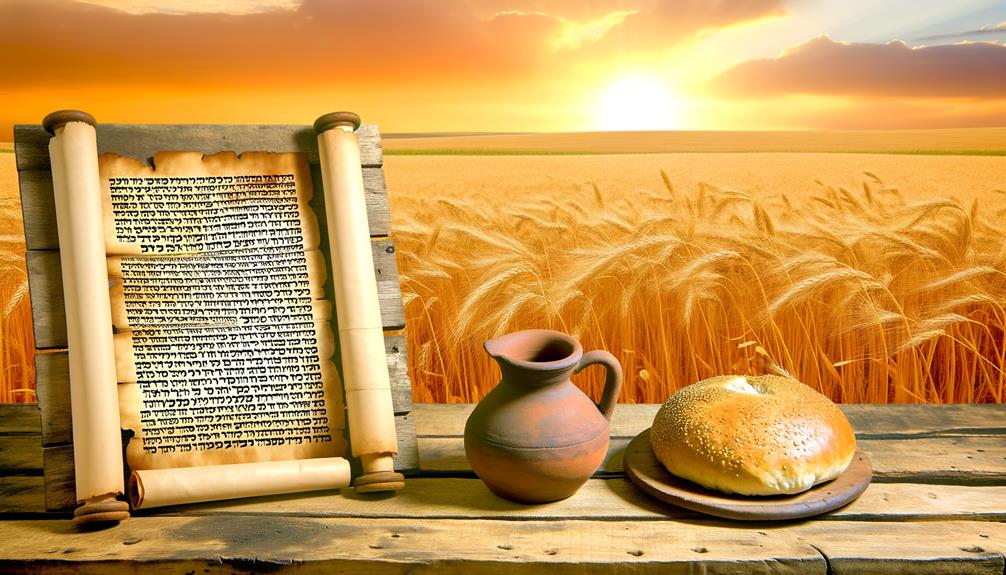
The phrase ‘daily bread‘ finds its origins in the Lord’s Prayer, as recorded in Matthew 6:11 and Luke 11:3, where it encapsulates a profound request for God’s provision in the day-to-day sustenance of believers.
In the original Greek manuscripts, the term ‘epiousios’ is used, which translates to ‘for the coming day’ or ‘necessary for existence.’ This petition reflects a deep reliance on divine providence, echoing the Israelites’ dependence on manna during their wilderness journey as described in Exodus 16:15-21.
The historical context underscores a theological assertion that God’s care is a constant, daily provision, not merely a one-time endowment.
Consequently, ‘daily bread’ emphasizes a continuous, intimate relationship between God and His followers, ensuring their physical and spiritual nourishment.
The Lord’s Prayer
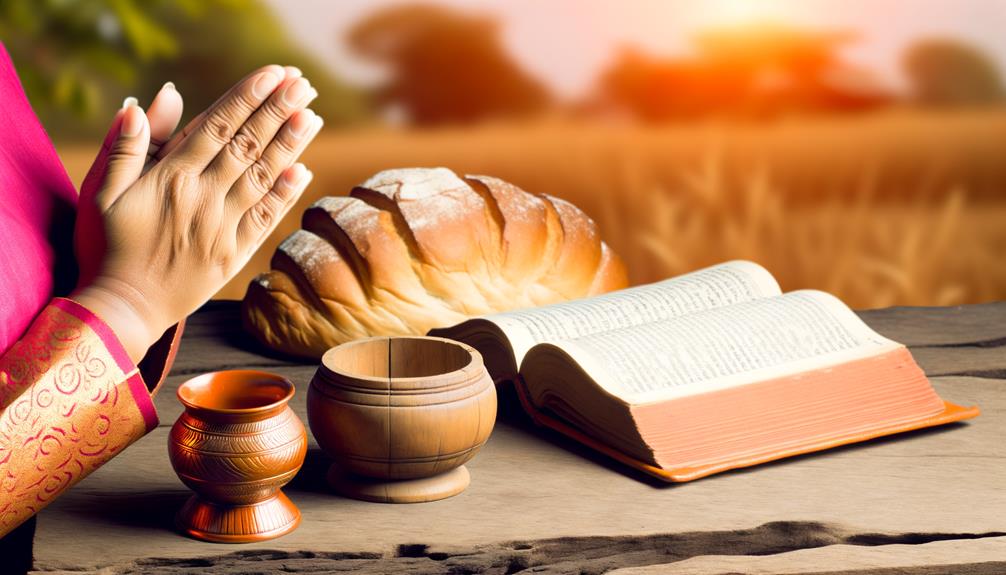
The phrase ‘daily bread‘ appears prominently in the Lord’s Prayer, as recorded in Matthew 6:11 and Luke 11:3, encapsulating both immediate sustenance and deeper spiritual nourishment.
Historically, this petition reflects the Israelites’ reliance on manna in the wilderness (Exodus 16), symbolizing God’s provision. Today, it continues to hold significant spiritual meaning, reminding believers of their dependence on God for both physical needs and spiritual growth.
Biblical Context Explained
Rooted in the heart of the Sermon on the Mount, the phrase ‘daily bread’ from the Lord’s Prayer (Matthew 6:11) encapsulates profound theological significance and historical context.
This supplication reflects an acknowledgment of God’s provision, echoing the Israelites’ dependence on manna in the wilderness (Exodus 16:4). It underscores a reliance on divine sustenance for both physical and spiritual nourishment.
Historically, bread symbolizes life and survival, integral to the daily existence of ancient communities.
Consider the following:
- Divine Provision: God’s continuous care and sustenance.
- Dependence: Human reliance on a higher power for daily needs.
- Covenant Relationship: Recognition of an ongoing relationship with God.
- Community: Shared prayer fostering unity and collective faith.
Understanding these facets enriches the profound depth of ‘daily bread.’
Spiritual Significance Today
In contemporary Christian practice, the invocation of ‘daily bread‘ within the Lord’s Prayer serves as a reminder of our ongoing dependence on God’s provision and grace. This phrase, originating from Matthew 6:11, emphasizes the believer’s reliance on God for both physical sustenance and spiritual nourishment.
Historically, the term ‘daily bread’ evokes the manna provided to the Israelites in the wilderness (Exodus 16), symbolizing God’s faithful provision. Today, it invites Christians to trust in God’s continuous care and to seek sustenance in Christ, the ‘bread of life’ (John 6:35).
This daily petition fosters a posture of humility and gratitude, acknowledging that all necessities—material and spiritual—are gifts from a benevolent Creator.
Physical Nourishment
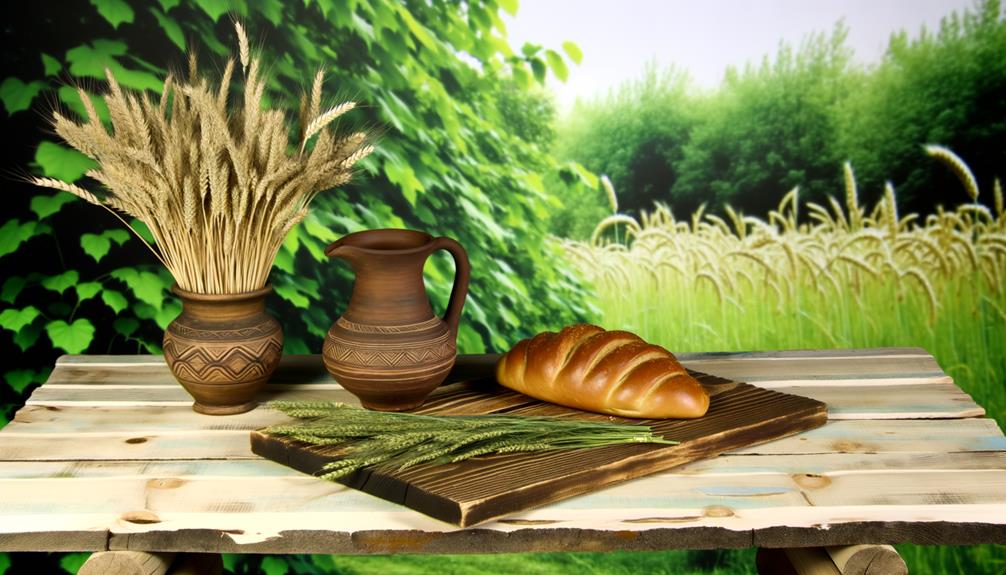
The concept of ‘daily bread‘ in the Bible primarily underscores the necessity of essential daily sustenance, as seen in the Israelites’ reliance on manna in Exodus 16:4.
This provision not only serves as a literal source of nourishment but also carries profound symbolic significance, reflecting a divine balance between spiritual and physical needs.
Essential Daily Sustenance
While the phrase ‘daily bread’ in the Bible primarily evokes the image of physical nourishment, it also embodies a deeper theological significance rooted in scriptures such as Matthew 6:11 and Exodus 16:4. The concept of ‘daily bread’ underscores God’s provision and our reliance on Him for essential sustenance.
Historically, this was vividly illustrated through:
- Manna in the Wilderness: God’s daily provision to the Israelites (Exodus 16:4).
- Jesus Feeding the Multitudes: Emphasizing divine care (Matthew 14:13-21).
- Elijah and the Widow: God’s miraculous sustenance in times of drought (1 Kings 17:8-16).
- The Lord’s Prayer: A daily petition for our physical needs (Matthew 6:11).
These instances evoke trust and gratitude for God’s faithful provision.
Biblical Food Symbolism
Biblical food symbolism serves as a profound theological representation of physical nourishment, illustrating God’s omnipresent care and sustenance through various scriptural narratives.
Manna from heaven in Exodus 16:4 symbolizes God’s provision during the Israelites’ desert sojourn, emphasizing reliance on divine providence. The feeding of the 5,000 in Matthew 14:13-21 underscores Christ’s role as the sustainer, mirroring Old Covenant themes of divine abundance.
Bread, frequently mentioned, epitomizes daily sustenance, as seen in the Lord’s Prayer (Matthew 6:11). Historical contexts reveal that food was not merely sustenance but a covenantal sign, as seen in shared meals such as the Passover (Exodus 12:14).
Therefore, food in the Bible is a tangible expression of God’s unwavering care and provision for His people.
Spiritual and Physical Balance
Understanding the intricate relationship between spiritual nourishment and physical sustenance is essential for comprehending the holistic care depicted in biblical teachings. Scripture intricately weaves these facets, as seen in Matthew 4:4, ‘Man shall not live by bread alone, but by every word that proceeds from the mouth of God.’
This underscores the necessity of balancing both aspects for a fulfilled life. Historically, manna provided in Exodus 16 symbolizes God’s provision, both physically and spiritually.
Here are four emotional evocations of this balance:
- Divine Care: God’s provision of daily needs.
- Inner Peace: Spiritual fulfillment that transcends physical hunger.
- Historical Continuity: Ancient practices that resonate today.
- Holistic Health: Integrating body and spirit for overall well-being.
Understanding this dual nourishment fosters a deeper connection with biblical truths.
Spiritual Sustenance

The concept of ‘daily bread’ extends beyond mere physical nourishment, symbolizing the essential spiritual sustenance that believers seek from God, as illustrated in Matthew 6:11.
This prayer highlights the dependence on God for daily spiritual needs, echoing the Israelites’ reliance on manna in the desert (Exodus 16:4). Jesus, in John 6:35, identifies Himself as the “bread of life,” emphasizing that spiritual fulfillment is found in Him. This divine sustenance nurtures faith, wisdom, and resilience, fostering a deeper communion with God.
| Scriptural Reference | Spiritual Implication |
|---|---|
| Matthew 6:11 | Dependence on God for daily needs |
| Exodus 16:4 | Trust in God’s provision |
| John 6:35 | Jesus as the source of life |
Understanding these scriptures enriches one’s spiritual journey, enhancing faith and trust in divine provision.
Historical Context
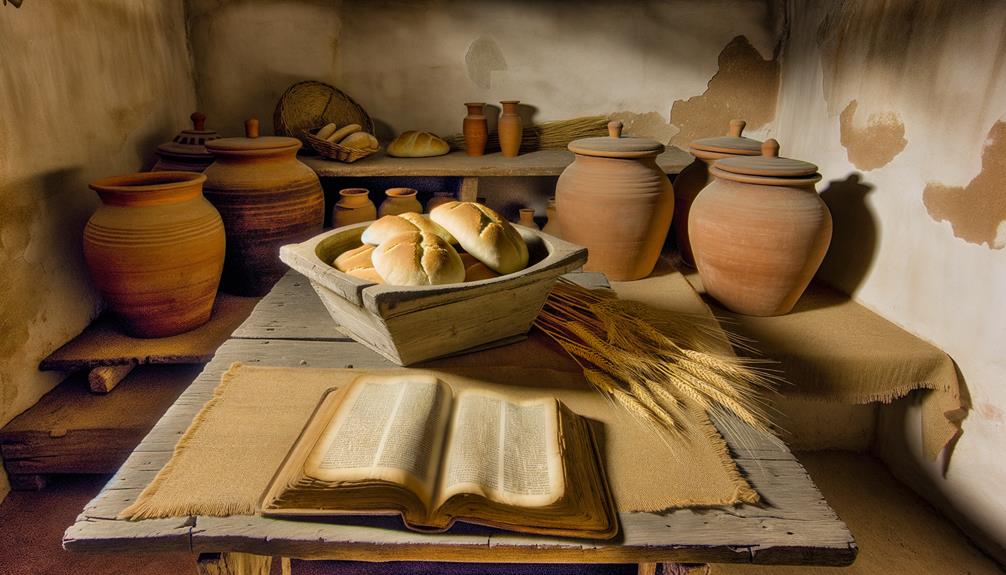
To fully grasp the meaning of ‘daily bread,’ it is essential to reflect on the historical and cultural context in which these scriptures were written. The term ‘daily bread’ appears in the Lord’s Prayer (Matthew 6:11), a pivotal text in Christian theology.
The historical setting of this scripture includes:
- Agrarian Society: Daily sustenance relied on the immediate consumption of locally-grown crops.
- Economic Struggles: Many lived in poverty, making daily provision a pressing concern.
- Jewish Traditions: The manna provided in the wilderness (Exodus 16:4) symbolized God’s provision.
- Roman Occupation: Heavy taxes and political instability exacerbated daily survival issues.
Understanding these elements deepens our appreciation of ‘daily bread’ as both a physical necessity and a divine promise.
Symbolism and Metaphor
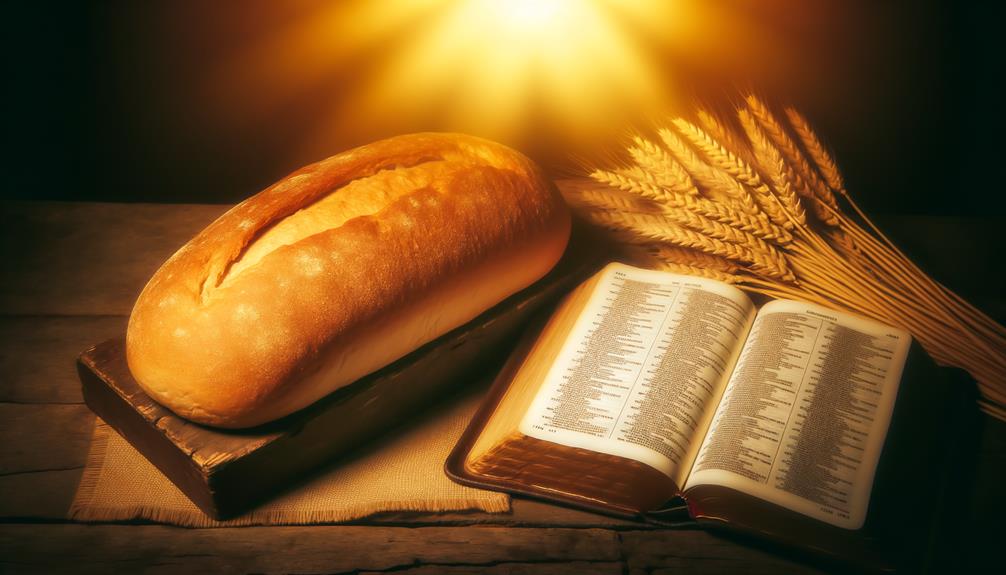
In examining the phrase ‘daily bread‘ within the Lord’s Prayer, one finds rich layers of symbolism that extend beyond mere physical sustenance, encompassing spiritual nourishment and divine dependence.
The term ‘bread’ recalls the manna provided to the Israelites in the wilderness (Exodus 16:4), signifying God’s provision.
Furthermore, Jesus’ self-identification as the ‘bread of life’ (John 6:35) underscores the idea that true sustenance is found in Him.
Augustine of Hippo interpreted ‘daily bread’ as the Eucharist, the spiritual food that sustains believers.
Consequently, ‘daily bread’ metaphorically represents God’s continuous care, reinforcing the belief that life’s necessities, both physical and spiritual, are gifts from a benevolent Creator, fostering a deeper reliance on divine providence.
Daily Dependence on God
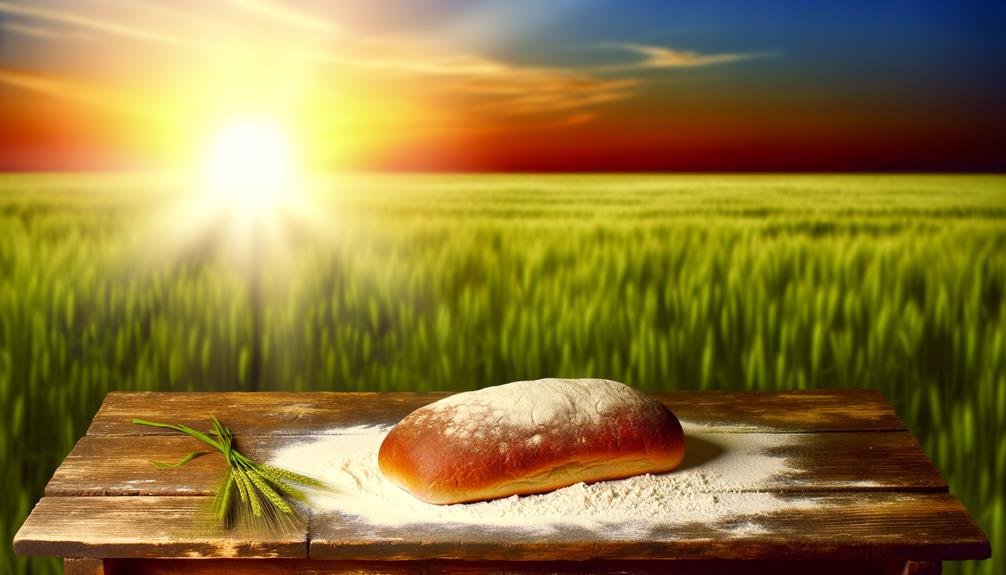
Recognizing ‘daily bread’ as both a symbol of divine sustenance and spiritual nourishment, one must also consider the profound theological implication of cultivating a daily dependence on God, as highlighted in Matthew 6:11 and reinforced throughout scripture.
This dependence, rooted in historical context, calls believers to trust in God’s provision consistently, reminiscent of the Israelites’ reliance on manna in Exodus 16. This daily trust cultivates a deeper relationship with God, emphasizing His role as the ultimate provider.
Consider the emotional resonance of:
- Constant Assurance – Trusting God’s daily provision eliminates anxiety.
- Spiritual Growth – Daily dependence fosters spiritual maturity.
- Divine Relationship – Cultivates a closer, more personal relationship with God.
- Historical Continuity – Connects contemporary faith practices with biblical history.
Modern Interpretations

Modern interpretations of ‘daily bread’ in the Bible often extend beyond physical sustenance to encompass spiritual, emotional, and communal dimensions, reflecting contemporary understandings of holistic well-being inspired by scripture.
This broader interpretation aligns with passages such as Matthew 4:4, “Man shall not live by bread alone,” emphasizing spiritual nourishment. The communal aspect is illustrated in Acts 2:46, where early Christians shared meals and fellowship, indicating a collective responsibility.
| Dimension | Scriptural Reference |
|---|---|
| Physical | Matthew 6:11 |
| Spiritual | Matthew 4:4 |
| Emotional | Psalm 23:1-3 |
| Communal | Acts 2:46 |
Thus, ‘daily bread’ serves as a metaphor for God’s provision in all facets of life, encouraging believers to seek divine sustenance continually.
Conclusion
In concluding, the term ‘daily bread,’ while deceptively simple, encapsulates a myriad of theological profundities ranging from tangible sustenance to ethereal spirituality.
One might jest that such a phrase is the divine equivalent of a Swiss Army knife—multifaceted and indispensable.
Whether contextualized through scripture, historical milieu, or symbolic metaphor, it serves as a daily reminder of humanity’s perpetual dependence on God.
Truly, ‘daily bread’ is no mere carbohydrate but a staple of existential and spiritual import.






